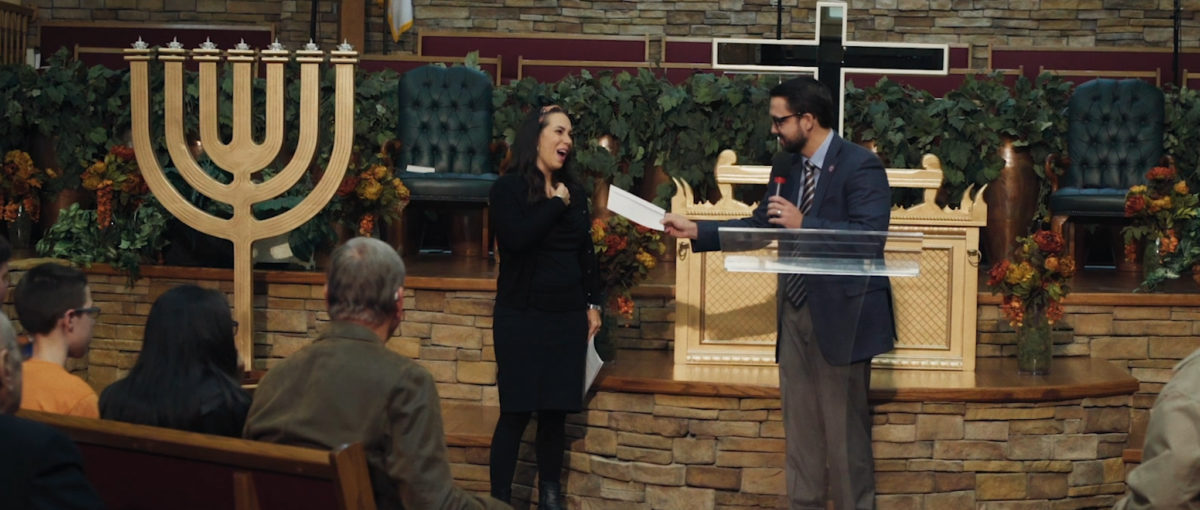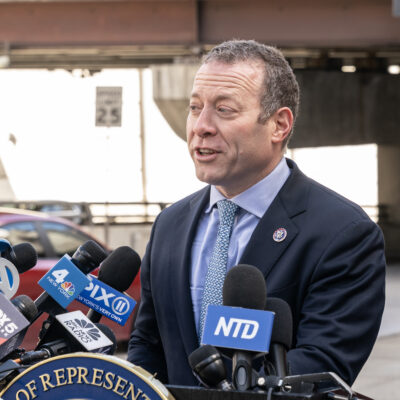Maya Zinshtein trains her lens on an uncomfortable alliance
The Israeli documentary filmmaker's latest film, ''Til Kingdom Come,' focuses on the relationship between Israeli Jews and evangelical Christians

Abie Troen/Til Kingdom Come
Yael Eckstein receives a check from Pastor Boyd Bingham at the Binghamtown Baptist Church in Middlesboro, Kentucky.
Israeli filmmaker Maya Zinshtein became something of a celebrity in, of all places, Middlesboro, Ky., while shooting her latest documentary.
“It came to a place where we would be recognized — we’d go after filming to buy some food and people would recognize us, saying: ‘Oh, you’re the Israelis!’” Zinshtein told Jewish Insider in a recent interview from her home in Tel Aviv. “It’s a small place, and to be there and to be, for most of these people, the first Jewish person they met,” was an eye-opening experience, she said.
Zinshtein — the director of the award-winning film “Forever Pure,” about the racism controversies that have dogged the Beitar Jerusalem soccer club — and producer Abie Troen took four or five trips to the town of about 10,000 in southeastern Kentucky while filming “‘Til Kingdom Come,” a documentary exploring the relationship between Israel and the American evangelical community. The film jumps between the streets of rural Kentucky, the hills of Judea and Samaria and the corridors of power in Washington to tell a story of faith, finance and a shaky friendship.
“‘Til Kingdom Come,” which aired on Israeli public television last year, will have its live virtual North American premiere on Thursday night, and will be available via a variety of virtual screenings starting Friday, before it airs on PBS March 29.
The documentary focuses on the efforts of the International Fellowship of Christians and Jews, founded by Rabbi Yechiel Eckstein in the 1980s, which collects close to $130 million a year from Christian evangelicals to support programs in Israel. Through the IFCJ, Zinshtein connected to the Binghamtown Baptist Church in Middlesboro, whose members focus the bulk of their charitable giving on Israel.
“It was interesting for me, especially when I understood that they come from a very poor area,” said Zinshtein of the people of Middlesboro, where close to 40% of the population lives in poverty — one of the highest rates in the country. “When I landed in Kentucky, and when I saw the Israeli flag in front of the church and the Star of David on the cross, I understood that this is the place” to tell the story, she said. “Because also I really wanted to tell this story, not only as a political story, but also from the grassroots level. And to understand why people from such a poor place donate their little money to some country that most of them never visited.”

Abie Troen and Maya Zinshtein while filming in Kentucky. (Courtesy)
That personal story focuses largely on the next generation of seemingly disparate figures: Yael Eckstein, the Jerusalem-based daughter of Rabbi Eckstein, and Boyd Bingham, the Kentucky church’s associate pastor, poised to one day take over for his father, Senior Pastor William Boyd Bingham.
The senior Eckstein died suddenly in February 2019 at age 67, while Zinshtein was in the middle of filming.
“We had a big interview with him scheduled for two weeks after he died,” she told JI. “I definitely planned to make Rabbi Eckstein my main character, but he constantly pushed me to Yael, and said, ‘You should speak with her. She’s the next generation.’ It’s almost crazy, it’s like he almost knew.”
And meeting the junior Pastor Bingham, said Zinshtein, made her realize that “it can be really interesting to make our main characters the young generation. Because I think it also brings questions of legacy into the film.”
Zinshtein explores the uncomfortable questions that lurk in the background of the relationship between Israeli Jews and evangelical Christians. Early on in the film, a presenter on a church-funded radio station proclaims that news of bombings in Israel “should give us all hope” that redemption is on the horizon. And a cringeworthy scene late in the film shows the Senior Pastor Bingham proselytizing to Zinshtein and Troen as they sit in the pews of the church, vowing to “get them saved” before the battle of End Times, where they will be forced to convert or be killed.
“We just found ourselves, instead of being the one that’s documenting the situation, we became part of the situation. And that was the first time but not the last time for sure,” said Zinshtein of that moment. “On the ground, I think once you spend more than one day with someone from this community, these questions would come — in the beginning in a more gentle way, then in a less gentle way. The fact that Abie and I don’t believe in Jesus, this is something that definitely concerns them.”
But the most jarring scene in the film for Zinshtein doesn’t take place in Kentucky at all, she said.
“The most shocking event for me was actually when we filmed at CUFI, the Christians United for Israel summit in Washington, D.C. [in 2018], when we saw 5,000 Christian evangelicals sent in this major lobby preparation event,” she said. Thousands of Christians organized by the summit arrived on Capitol Hill to lobby President Donald Trump to cut aid to the Palestinian Authority. “Not all of them understand even what they’re doing,” said Zinshtein. “They just go in and say exactly what they have been said to do,” she added, noting that even many Israeli security officials were opposed to cutting such aid.
“And then a month later, Trump actually cuts the aid,” pointed out Zinshtein. “This was just an unbelievable example of how much power they have… it’s not an equal relationship,” she added, citing Trump’s comments last year that he moved the U.S. Embassy to Jerusalem for the evangelicals. “They are much bigger than us… [Israelis] need to understand we’re a tiny, tiny part in their story.”
But issues of evangelical support for Israel, said Zinshtein, are rarely ever discussed by average Israelis, who have little understanding of the scope of their efforts and beliefs.
“The Israeli understanding about the Christian evangelical involvement here basically goes to these highlights of, ‘Oh, there are these Christians that love us,’ and no one asks what this love means,” she said. “And I don’t think [anyone] understands that this is not an unconditional love. And these gifts that we’re receiving from them… I think that there’s a price that comes attached to that.”
After the documentary was broadcast on Israeli television in October, Zinshtein said it sparked a debate surrounding the issues raised in the film.
“I think it initiated a very healthy conversation: Is it good for the Jews or bad for the Jews?” she said. “And of course, it’s not black and white.”









